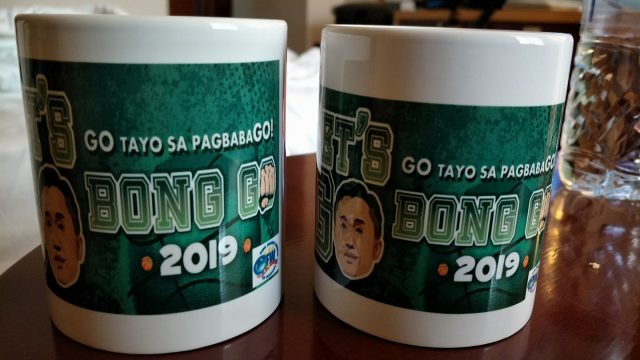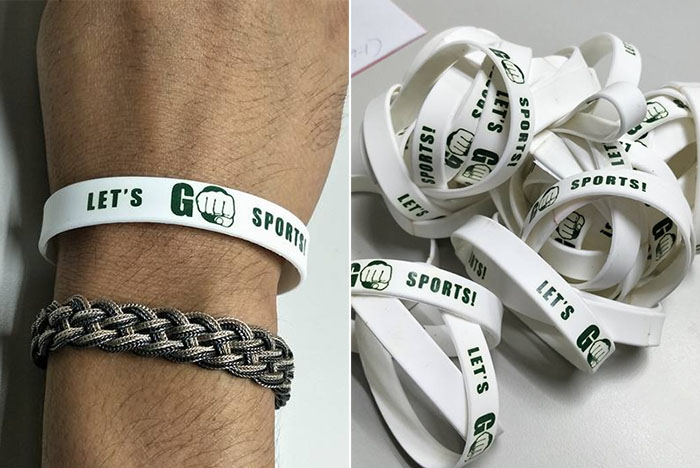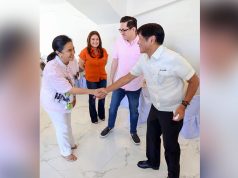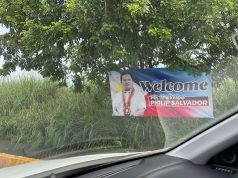
Highlights:
- The public are already starting to notice publicity drives by supposed 2019 political aspirants.
- Many find them annoying, but such efforts we call “early campaigning” are not exactly against the law.
- An election officer says elections laws have to be updated to clarify all ambiguities that allow early campaigns.
Much to the chagrin of the public, some of the projected candidates of the 2019 senatorial elections have made some early noise.
Recently, Interaksyon reported on a series of uncanny graduation greetings from public officials from around the Philippines.
One of the incidents of unexpected public greetings from public servants picked up on was a tarpaulin bearing a greeting from presidential spokesperson Harry Roque, who has been announced a possible senatorial candidate for the supermajority PDP-Laban slate next year.
Not everyone has taken too kindly to the polarizing spokesperson’s unsolicited message of congratulations.
I think this is a better version. pic.twitter.com/SPTPRpBwVs
— swimmer07 (@otherswimmerpls) April 4, 2018
Early last month, Roque was once again the subject of controversy after photos of cardboard fans bearing his portrait and detailing the house bills he filed during his time as representative for Kabayan Party-list were distributed at an appearance in Cebu.
Alam na alam mo agad yung mga may balak humabol next elections ? pic.twitter.com/bxRnHdDuZY
— Ruzzie ✨ (@ruzvaldez) March 2, 2018
Roque, while he admitted having a plan to run for senator next year, has since denied allegations that public funds were used to fund production of the publicity materials where he mentions Malacañang post, not his senatorial bid.
Last month, Roque said it was Cebu Gov. Gwen Garcia who funded the distribution of the fans.
The allegations against Roque only mark the beginning of a noted rise in publicity from some of the figures named in last month’s string of senatorial slate announcements.
Special Assistant to the President Bong Go, another projected candidate in the PDP-Laban slate, has been the subject of numerous endorsements from various administration figures, including the president himself.
Social media has also seen the rise of various groups that appear to have been formed for the purpose of campaigning for Go in next year’s elections. One post from a group called “SAP Bong Go for Senator Movement” shows what appear to be ballers made to publicize the typically soft-spoken and withdrawn presidential aide.

Another group publicizing the possible senatorial aspirant is the “Friends of Bong Go”, which appears to have numerous city-based chapters.
Another purported participant in next year’s senatorial battlefield appears to have also made a series of noted public appearances since last month’s drawing of campaign battle lines.
Sen. Bam Aquino of the opposing Liberal Party has given a series of commencement speeches in the past few weeks.
EARLIER: Sen. Bam Aquino as Commencement Speaker at Olivarez College’s 12th Commencement Exercises. Thank you, Olivarez College for the invite. #Tagaytay [TeamBam] pic.twitter.com/eDrPSj1mBu
— Bam Aquino (@bamaquino) April 4, 2018
Sen. Bam Aquino as Graduation Speaker at the 64th Commencement Exercises of West Visayas State University- Lambunao, Iloilo. #BamInIloilo [TeamBam] pic.twitter.com/sHhUizWY8J
— Bam Aquino (@bamaquino) March 27, 2018
Aquino last month announced that he was running under the LP’s self-styled “The Resistance” slate, dispelling earlier reports that he would be joining re-electionist senators under Davao City Mayor Sara Duterte’s Hugpong ng Pagbabago.
Recently, Education Secretary Leonor Briones gave a stern reminder to keep politics out of graduation rites.
Ambiguous laws and ambiguous campaigns
Interaksyon has reached out to a member of the Commission on Elections to ask for some insight on what the current election laws can provide for alleged incidents of “premature campaigning.”
Lawyer Gregorio Bonifacio, Election Officer IV of San Juan City, believes that there is nothing illegal about the apparent publicity next year’s possible candidates have been receiving.
“As long as the person has not yet filed any certificate of candidacy, then he is not yet technically a candidate. As such you cannot consider it as premature campaigning because he is not yet running for any position,” said Bonifacio in an email interview.
“This question keeps on popping [up] very now and then. Solution? Change the law and define all the ambiguity,” he added.
“This question keeps on popping up every now and then. Solution? Change the law and define all the ambiguity.”
Bonifacio also remarked that in the case of private groups or organizations initiating “early” campaigns for possible candidates, there are no law to prevent them from doing so.
In effect, only political aspirants who have filed for candidacy are bound by election laws.
It may sound frustrating to voters annoyed by the “early campaign” materials in public places. Bonifacio said, however, that COMELEC is taking steps to remedy the situation.
“As of now, the COMELEC is revising or making a proposal to amend and consolidate all election laws,” Bonifacio told Interaksyon.









